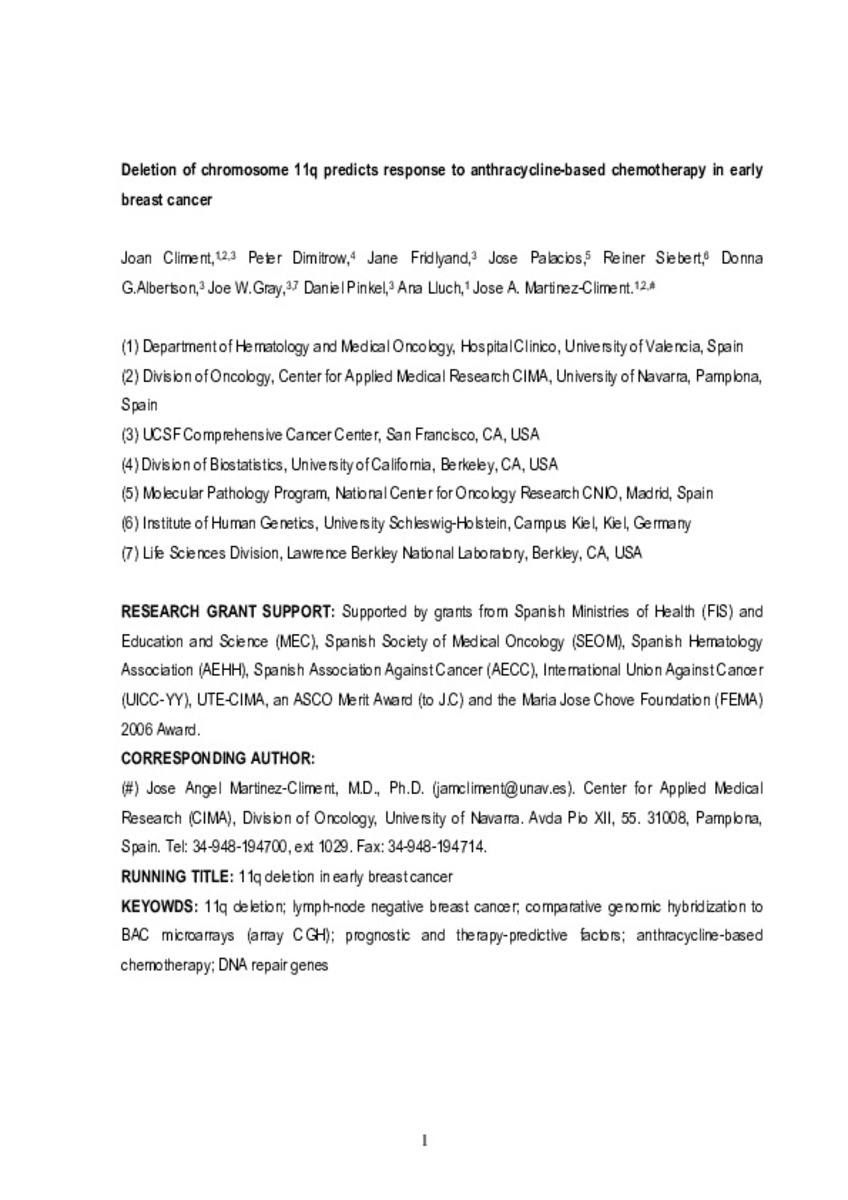Registro completo de metadatos
| Campo DC | Valor | Lengua/Idioma |
|---|---|---|
| dc.creator | Climent, J. (J.) | |
| dc.creator | Dimitrow, P. (P.) | |
| dc.creator | Fridlyand, J. (J.) | |
| dc.creator | Palacios, J. (José) | |
| dc.creator | Siebert, R. (Reiner) | |
| dc.creator | Albertson, D. (Donna G.) | |
| dc.creator | Gray, J.W. (Joe W.) | |
| dc.creator | Pinkel, D. (Daniel) | |
| dc.creator | Lluch, A. (Ana) | |
| dc.creator | Martinez-Climent, J.A. (José Ángel) | |
| dc.date.accessioned | 2011-05-09T08:04:13Z | - |
| dc.date.available | 2011-05-09T08:04:13Z | - |
| dc.date.issued | 2007 | - |
| dc.identifier.citation | Climent J, Dimitrow P, Fridlyand J, Palacios J, Siebert R, Albertson DG, et al. Deletion of chromosome 11q predicts response to anthracycline-based chemotherapy in early breast cancer. Cancer Res 2007 Jan 15;67(2):818-826. | es_ES |
| dc.identifier.issn | 1538-7445 | - |
| dc.identifier.uri | https://hdl.handle.net/10171/17895 | - |
| dc.description.abstract | Despite the recent consensus on the eligibility of adjuvant systemic therapy in patients with lymph node–negative breast cancer (NNBC) based on clinicopathologic criteria, specific biological markers are needed to predict sensitivity to the different available therapeutic options.W e examined the feasibility of developing a genomic predictor of chemotherapy response and recurrence risk in 185 patients with NNBC using assembled arrays containing 2,460 bacterial artificial chromosome clones for scanning the genome for DNA copy number changes.Aft er surgery, 90 patients received anthracyclinebased chemotherapy, whereas 95 did not.T amoxifen was administered to patients with hormone receptor–positive tumors. The association of genomic and clinicopathologic data and outcome was computed using Cox proportional hazard models and multiple testing adjustment procedures.Analysis of NNBC genomes revealed a common genomic signature.Specific DNA copy number aberrations were associated with hormonal receptor status, but not with other clinicopathologic variables. In patients treated with chemotherapy, none of the genomic changes were significantly correlated with recurrence.In patients not receiving chemotherapy, deletion of eight bacterial artificial chromosome clones clustered to chromosome 11q was independently associated with relapse (disease-free survival at 10 years F SE, 40% F 14% versus 86% F 6%; P < 0.0001). The 54 patients with deletion of 11q (29%) did not present more aggressive clinicopathologic features than those without 11q loss.The adverse influence of 11q deletion on clinical outcome was confirmed in an independent validation series of 88 patients with NNBC.Our data suggests that patients with NNBC with the 11q deletion might benefit from anthracycline-based chemotherapy despite other clinical, pathologic, or genetic features.However , these initial findings should be evaluated in randomized clinical trials. | es_ES |
| dc.language.iso | eng | es_ES |
| dc.publisher | American Association for Cancer Research | es_ES |
| dc.rights | info:eu-repo/semantics/openAccess | es_ES |
| dc.subject | Anthracyclines | es_ES |
| dc.subject | Breast Neoplasms | es_ES |
| dc.title | Deletion of chromosome 11q predicts response to anthracycline-based chemotherapy in early breast cancer | es_ES |
| dc.type | info:eu-repo/semantics/article | es_ES |
| dc.relation.publisherversion | http://cancerres.aacrjournals.org/content/67/2/818 | es_ES |
Ficheros en este ítem:
Estadísticas e impacto
Los ítems de Dadun están protegidos por copyright, con todos los derechos reservados, a menos que se indique lo contrario.






